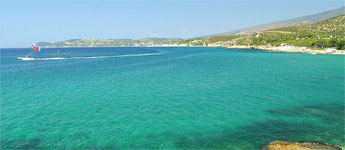Thassos Island - Mythlogy
According to the ancient Greek mythology, one of the many love affairs of Zeus (the greatest god of the ancient Greeks) led to the discovery of the island.
One spring day Zeus transformed himself into a bull, kidnapped Europe (the daughter of the Phoenician King Agenor) and took her to Crete. There, from their sacred union three sons were born: Minos (the famous King of Crete), Rhadamanthys (the wise lawgiver) and Sarpedon (the first King of Lycia).

The Phoenicians did not tolerate the rape of Europe and King Agenor (the King of Phoenicia and Europe 's father) organised an expedition in order to find his daughter and take her back home. The expedition was led by his sons, Phoenix, Cilix and Cadmus (brothers of Europe), and Thasos (who was either the son or grandson of Agenor - today it is impossible to comprehend of whom Thassos was the son, as the legends about him are very old and not very exact). King Agenor ordered them to look high and low for Europa and not to return unless they found her. And while Zeus and Europe enjoyed their love in Crete , Agenor's sons were wandering to the ends of the earth to find their sister.
Phoenix set out towards the south. Cilix went north until he reached a fertile land where he made himself king: since then it has been known as Cilicia . After wandering through the Greek islands, Cadmus continued his search in mainland Greece . He visited the oracle of Apollo at Delphi and consulted Pythia the priestess. Although he followed her advice, he was unable to find Europa. Then Cadmus built a town which he named Thebes .
During the research, Thasos reached at some point this island. He was enchanted by the wonderful climate and the luxuriant vegetation of the island and as he could not return home without Europe , he gave up and settled here on the island that bears his name since then. Herodotus, the greatest historian of antiquity, is categorical on this matter. He says the island is "now called after that Phoenician Thassos". (Herodotus, Histories, 6.47.1).
Another myth (which was probably shaped by the inhabitants of Paros island after their establishment in Thassos) refers that Hercules donated the island of Thassos to Sthenelos and Alcaios, the two sons of King Androgeus of Paros.
Still, Thassos was the first inhabitant of this island which bares his name. Nevertheless, there are other and maybe more credible resources about the origin of the name of the island. Some ancient poets and writers refer to Thassos as "Aeria" for its cool summer breeze. It was also called "Aethria" for its clear sky, "Chrisi" for the gold of its goldmines, or "Seashore of Demetra" for the rich and exquisite fruits. According to a different resource, the etymology of the name "Thassos" relates to the word "Drosos" (=cool), because of the many forests it had in anyiquity and continues to have today.Others combine the name of the island with some weather-related words, such as Asos, Kosos, Vrastoi.
Religious belief of the Thasians, as of all the ancient Greeks, was centered on the twelve gods of Olympus . However, the island's patron was Heracles, a name which may have had its origins not in the Greek halfgod Heracles (Hercules), but in the Phoenician god Melkarth. Special honors were reserved for the god of the sea Poseidon and the goddess of the hunt Artemis.
Dionysus, god of wine, together with his Satyrs, Silenoi and Maenads, were worshiped in orgiastic rites.
















